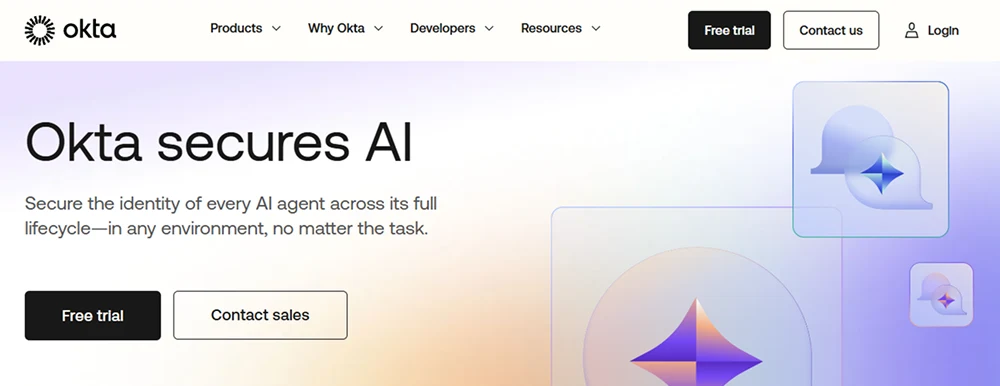Okta(Identity) Overview & 2026 Industry Position
Okta(Identity) remains at the forefront of the access management space in 2026, leading with specialized solutions in single sign-on (SSO), multi-factor authentication (MFA), lifecycle management, and API access controls. With hybrid work, zero-trust frameworks, and AI-driven security on the rise, Okta(Identity)’s modular identity-as-a-service (IDaaS) model is well poised for enterprises modernizing their access infrastructure. Hundreds of Fortune 500 companies—and thousands of mid-market organizations—trust Okta(Identity) to help mitigate breaches, reduce IAM friction, and enable agile identity governance.
From Launch to 2026: Okta(Identity)’s Journey
Founded in 2009 by Todd McKinnon and Frederic Kerrest, Okta started as a universal SSO solution targeting cloud-first businesses. By 2013, it expanded with enterprise mobility features. In 2017, it went public, while broadening its portfolio with customer identity tools. A pivotal moment came in 2021 with the acquisition of Auth0, expanding developer-centric capabilities. In 2023 and 2024, Okta invested heavily in AI pattern recognition and risk scoring for dynamic access decisions. The 2026 strategy centers on scalable identity orchestration—merging policy, context, and automation into a single, low-code fabric.

Okta(Identity) Key Features
At its core, Okta(Identity) Platform offers a flexible suite of identity security solutions that bridge workforce and customer access:
- SSO (Single Sign-On) – Centralized access control across 7,000+ pre-integrated applications.
- Adaptive MFA – Contextual access checks using geolocation, device trust, and threat insights.
- Lifecycle Management – Automates onboarding/offboarding flows via HRIS sync and app connectors.
- Identity Governance – Unified policy management, certification campaigns, SoD enforcement (2024 launch).
- Fine-Grained API Access – OAuth-based user and machine token handling.
- Workforce & Customer Identities – Distinct admin consoles and feature scope for B2B and B2C identities.
- Okta AI – Identity threat detection powered by anomaly detection and fine-tuned scoring models.
Workflow & UX
The Okta(Identity) admin console emphasizes clarity for compliance teams and IT admins alike. Its intuitive modules for access requests, directory integrations, and security insights stand out. Role-based views enable granular permissions, while the user portal simplifies app access with bookmark tiles. Dev teams can tap the developer-focused dashboard (formerly Auth0) for SDKs in Python, Node.js, Java, Go, etc. Across platforms, identity objects remain portable and schema-flexible.
Okta(Identity) Pricing Analysis & Value Metrics
| Product | Monthly Pricing (per user) | Features |
|---|---|---|
| SSO | $2 | Core access management, app directory, policy enforcement |
| MFA | $3 | Step-up auth, contextual logins, intelligent risk-based controls |
| Lifecycle Management | $4 | HR-driven identity flows, real-time provisioning, access recertification |
| Customer Identity Cloud | Starts at $23/month | B2C auth, login box, profile workflows, localization tools |
| Identity Governance | $7 | Access reviews, policy grants, role-mining, SoD library |
Pricing scales affordably for SMBs while offering deep governance and orchestration for enterprise clients. Okta(Identity)’s pay-per-user model aligns cost to actual access points managed.
Competitive Landscape
| Provider | Strengths | Weaknesses |
|---|---|---|
| Microsoft Entra ID | Native M365 tie-ins, Azure Directory compatibility | Limited non-Microsoft integrations |
| Duo Security (Cisco) | Strong MFA-only focus, lower cost | Minimal account provisioning or governance tools |
| Ping Identity | Strong for legacy SAML support in finserv | UI and admin usability less intuitive than Okta |
Use Cases
- Fast-growing startups managing dev and back office has SSO + HR sync
- Enterprises needing audit-compliant workflows for employee transitions
- Fintech and healthtech apps securing B2C auth via Okta’s CIAM tools
- Remote-first teams requiring stable integration with device trust
Okta(Identity) Integrations
Okta(Identity) supports 7,500+ pre-built integrations spanning business apps, Cloud IaaS, productivity suites, CRMs, payroll, VPN clients, and more. Notable integrations include:
- Workforce: Zoom, Slack, Asana, Notion, Webex
- HRIS/Payroll: Workday, Gusto, BambooHR
- CRM/ERP: Salesforce, NetSuite, HubSpot
- Cloud: AWS IAM, Azure AD, GCP IAM
- Security: Crowdstrike, Palo Alto, Zscaler
Pros & Cons
- Pros: Best-in-class coverage of identity journeys; strong customer and workforce identity separation; granular security controls.
- Cons: Learning curve for full lifecycle automation; higher cost vs SSO-only providers; complex pricing for hybrid use cases.
Final Thoughts
Okta(Identity) is a confident pick for security-conscious businesses that demand granular access control without sacrificing UX. It suits midmarket and enterprise buyers especially well—those needing detailed access policies, prebuilt app flows, and managed identities at scale. Smaller orgs or dev-first teams may find the entry cost steeper, but the architecture remains clean and developer-literate.
Pro Tip: Bundle MFA and Lifecycle modules early—Okta offers discounts for multi-module users and deployment timelines shorten by 35%.
Okta(Identity) FAQ
Yes, specifically its SSO or MFA modules offer affordable entry points with limited complexity. However, full orchestration may be better suited to mid-market scales.
Yes, Okta supports real-time integration with Microsoft Active Directory and LDAP directories, syncing user and group data automatically.
Auth0 is now the developer-identity layer (Customer Identity Cloud) within Okta, focusing on CIAM and extensibility through custom code and SDKs.
Extremely secure. It operates zero-trust principles, supports data residency controls, and has SOC 2, ISO, GDPR, HIPAA compliance across its stack.
Yes, most products offer a 30-day free trial. Workforce Identity offerings include test apps and admin tools out of the box.

